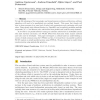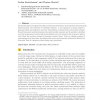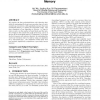WCET
2010
13 years 2 months ago
2010
To take full advantage of the increasingly used shared-memory multicore architectures, software algorithms will need to be parallelized over multiple threads. This means that thre...
WCET
2010
13 years 2 months ago
2010
Calculating the worst-case execution time (WCET) of real-time tasks is still a tedious job. Programmers are required to provide additional information on the program flow, analyzi...
WCET
2010
13 years 2 months ago
2010
The present paper investigates the influence of the execution history on the precision of measurementbased execution time estimates for embedded software. A new approach to timing...
ISOLA
2010
Springer
13 years 2 months ago
2010
Springer
Abstract. The Implicit Path Enumeration Technique (IPET) has become widely accepted as a powerful technique to compute upper bounds on the Worst-Case Execution Time (WCET) of time-...
EMSOFT
2010
Springer
13 years 2 months ago
2010
Springer
We propose the first polynomial-time code selection algorithm for minimising the worst-case execution time of a nonnested loop executed on a fully pipelined processor that uses sc...
SEUS
2010
IEEE
13 years 2 months ago
2010
IEEE
Real-time systems need to be time-predictable in order to prove the timeliness of all their time-critical responses. While this is a well-known fact, recent efforts of the communit...
RTS
2010
13 years 2 months ago
2010
The current practice to design software for real-time systems is tedious. There is almost no tool support that assists the designer in automatically deriving safe bounds of the wor...
ISOLA
2010
Springer
13 years 3 months ago
2010
Springer
In object oriented languages, dynamic memory allocation is a fundamental concept. When using such a language in hard real-time systems, it becomes important to bound both the worst...
IEEECIT
2010
IEEE
13 years 3 months ago
2010
IEEE
Current hard real-time scheduling and analysis techniques are unable to efficiently utilize the computational bandwidth provided by multicore platforms. This is due to the large ...
TC
2002
13 years 4 months ago
2002





